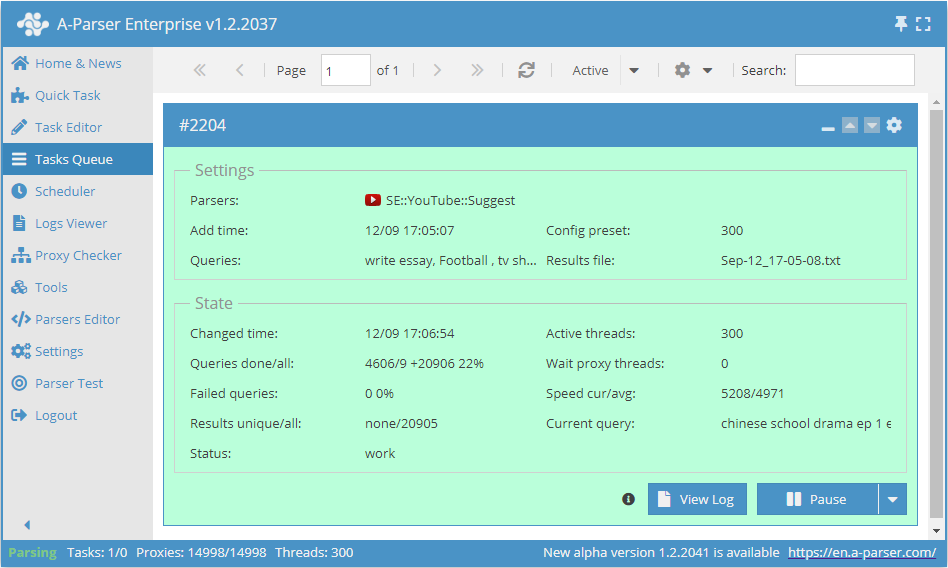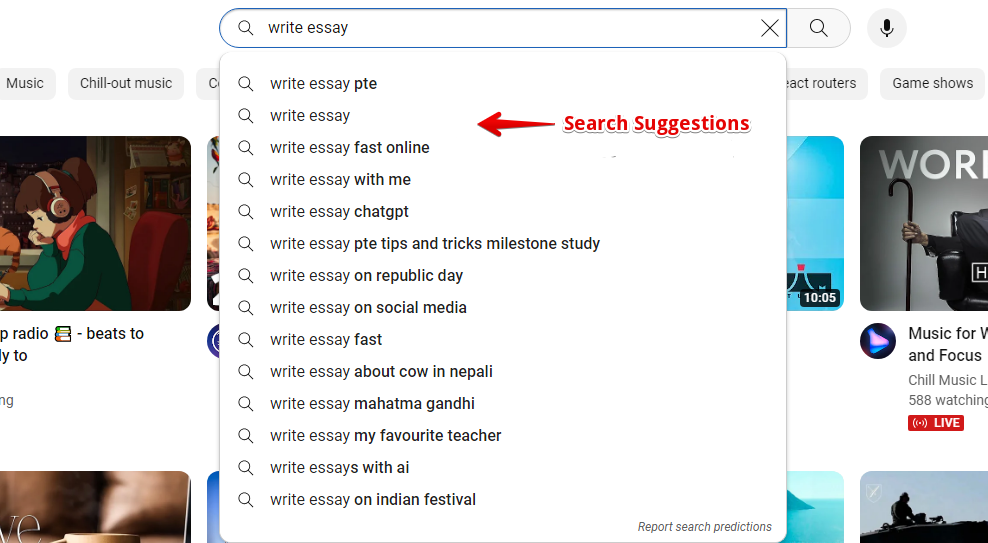SE::YouTube::Suggest - YouTube Suggest Scraper
Overview of the scraper
A scraper for search suggestions based on keywords on YouTube. The YouTube suggestion scraper solves one of the main SEO tasks, namely the rapid automated acquisition of an expanded semantic core. Thanks to the SE::YouTube::Suggest scraper, you can automatically collect keyword bases from YouTube search engine suggestions based on a query. Using the SE::YouTube::Suggest scraper, you can easily and quickly scrape YouTube suggestions for a query based on the selected country, language, or domain.
Thanks to A-Parser's multi-threaded operation, query processing speed can reach 6000 queries per minute, which on average allows receiving up to 13500 results per minute.

You can use automatic query multiplication, substitution of sub-queries from files, iteration of alphanumeric combinations and lists to get the maximum possible number of results. Using results filtering you can immediately clean the results by removing all unnecessary junk (using negative keywords).
A-Parser's functionality allows saving the parsing settings of the SE::YouTube::Suggest scraper for future use (presets), setting a parsing schedule, and much more.
Results can be saved in the form and structure you need, thanks to the built-in powerful templating engine Template Toolkit which allows applying additional logic to the results and outputting data in various formats, including JSON, SQL and CSV.
Collected data
- YouTube suggestions for a query

Capabilities
- Supports selecting the search country and results language
Use Cases
- Collecting keyword bases
Queries
Search phrases should be specified as queries, for example:
write essay
Football
tv show
Waterfall
Speak in english
Cats and dogs
forex
forex trade
cheap essay
Query substitutions
You can use built-in macros for automatic substitution of sub-queries from files. For example, if we want to add a list of other words to each query, we will specify several main queries:
essay
article
thesis
In the query format, we specify a macro for substituting additional words from the file Keywords.txt, this method allows increasing the variability of queries many times over:
{subs:Keywords} $query
This macro will create as many additional queries as there are in the file for each original search query, which in total will give [number of original queries (domains)] x [number of queries in the Keywords file] = [total number of queries] as a result of the macro's operation.
For example, if the file Keywords.txt will contain:
buy
cheap
As a result, the substitution macro will turn 3 main queries into 6:
buy essay
cheap essay
buy article
cheap article
buy thesis
cheap thesis
Output results examples
A-Parser supports flexible results formatting thanks to the built-in templating engine Template Toolkit, which allows it to output results in any desired form, as well as in structured formats such as CSV or JSON
Exporting a list of suggestions
Analogous to SE::Google::Suggest.
Outputting to a CSV table
Analogous to SE::Google::Suggest.
Saving in SQL format
Result format:
[% FOREACH results;
"INSERT INTO serp VALUES('" _ query _ "', '"; suggest _ "')\n";
END %]
Example result:
INSERT INTO serp VALUES('write essay', 'write essay')
INSERT INTO serp VALUES('write essay', 'write essay with me')
INSERT INTO serp VALUES('write essay', 'write essay fast')
INSERT INTO serp VALUES('write essay', 'write essay for free')
INSERT INTO serp VALUES('write essay', 'write essay music')
INSERT INTO serp VALUES('write essay', 'write essays for money')
INSERT INTO serp VALUES('write essay', 'write essay fast music')
INSERT INTO serp VALUES('write essay', 'write essay subliminal')
INSERT INTO serp VALUES('write essay', 'write essay south park')
INSERT INTO serp VALUES('write essay', 'write essays faster')
...
Dumping results to JSON
Analogous to SE::Google::Suggest.
Results processing
A-Parser allows processing results directly during scraping, in this section we have provided the most popular use cases for the SE::YouTube::Suggest scraper
Option Parse to level
Analogous to SE::Google::Suggest.
Filtering results (using negative keywords)
Analogous to SE::Google::Suggest.
Possible settings
| Parameter Name | Default Value | Description |
|---|---|---|
| Results language | English | Selection of results language |
| Search from country | United States | Selection of the search country |